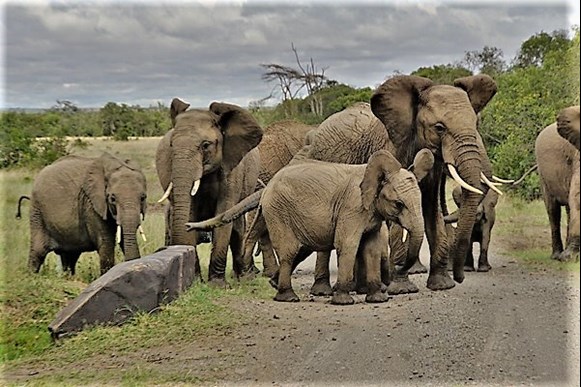During the 2018 autumn half term, plus a few days, all eight of the 1st Byfield Scout Troop, went on an expedition to Africa. The Troop is made up of two girls Emily and Mima, and six boys, Charlie, Felix, Jack, James, Max and Ted, the youngest of those being just eleven years old. Mima was the eldest and we hope will progress to be a Young Leader in Scouting. To that end, she’ll be helping with our Beavers soon.
Inspiring? On Monday evening, 7th January 2019, with their Skipper, Sally Huband acting as Master of Ceremonies, in their own words our Scouts told members of the Byfield and District Royal British Legion, together with some of their relatives and friends, about their experience. To say the least, their expedition was an inspiration, and we felt that it deserved a page of its own on our Web site.

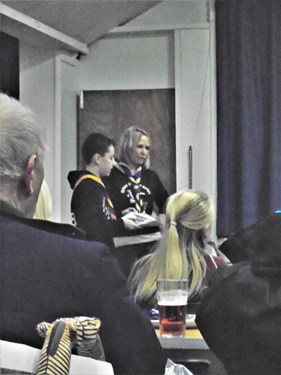
This was at one of our Speaker Meetings, with our Branch Meeting following-on but this time, in anticipation of their being wider interest, we booked the main part of Byfield’s Village Hall, instead of its much smaller Meeting Room. We were pleased to do this and to see there certainly was a lot of support, with there being more than two dozen in the audience. In addition, all our Scouts attended, as well as their Group Scout Leader Helen.
No balls? With Skip Sal introducing her team one by one to talk to us, punctuating her general narrative and backing-up the slides she was showing, we heard that this started over a year ago. Back then, she and her brother, another Scout leader, Andy McLean*, had told our Scouts how their contemporaries, a Scout Troop in Nairobi, played football - without footballs. They had a pitch of sorts, although there wasn’t much grass, just an open space, which became a muddy field when it rained. They also had goal posts but no nets or crossbar. AND their balls were home-made, by stuffing plastic bags with rags and paper!
*Andy had spent some time working in Nairobi the year before. In his spare time, he leads a Scout Troop in Exeter.
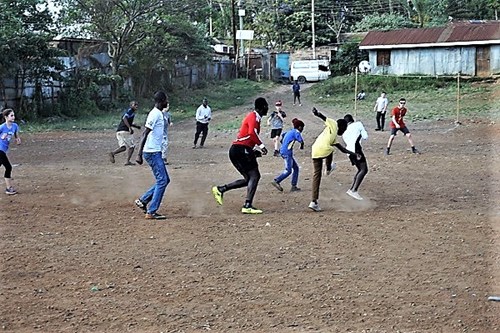
Like many youngsters ours are big fans of football and couldn’t believe what they were hearing. They immediately said that they should buy some footballs and send them out; then some bright spark suggested to ensure delivery, they should take the balls and present them personally.
Obviously very pleased with her Troop, Skip then said, “OK, let’s do it. After all, Scouting is all about adventure and challenge. What could be more adventurous (and challenging) than taking a group of Scouts from rural UK to Africa?”
Biggest slum? Their first task was to contact the Kenyan Scouts. Kenya has a very active and well-run Scout organisation, and with modern communications, this wasn’t as difficult as it sounds. Our boys and girls corresponded with Kenya’s Rowallan National Scout camp in Nairobi and through them found Kibera’s Open Scout Group Leader and Scout Camp Manager, a larger than life local simply known as Solomon. It was Kibera our youngsters had been discussing; Kibera is often described as the biggest slum in the world and it was very encouraging to hear it had its own Scout Troop.
Solomon was very enthusiastic about the planned visit and told our Scouts all about his Troop and what they had, and mostly hadn’t got in the way of kit. Our youngsters then expanded their list of things they hoped to take with them from footballs to shirts, shorts, boots and even tents; their Kibera counterparts had only one tent that was serviceable, a big old and very heavy canvas thing, and that was more or less permanently pitched.
Cash? Obviously, cash was required and a lot of it, so our intrepid team began a year of fundraising activities. Those included clearing out their clutter, and selling it together with knitted Easter chicks and home baked cakes in boot, garage and fête sales. They organised a stall at Cropredy’s annual “Fairport Music Festival” and sold water to the revellers. As luck would have it, after a scorching week the festival’s weekend, as usual, came with some cloud, some rain and cooler temperatures but it was still warm and business was brisk. The organisers, when they heard of the reason our Scouts were there, generously waived their claim to a percentage of the profits. Then there were quizzes to be organised and sweepstakes to be run. Top-ups were still needed and were obtained through donations from kindly local folk, a significant sponsorship by Cummins’ engines of Daventry, and of course, parents. We RBL oldies gave them a few bob and some craft stuff too, this talk was their “thank you” to us.
Smells? The big day was soon upon them and off they went, more than four thousand miles south, to Nairobi, via Paris arriving in Africa in the cool of the late evening after a very full day’s travelling. The weather was no problem, it being very similar to a typical English summer and not dissimilar to that Cropredy weekend but the smells? The smell of the tropics is difficult to describe, especially when mixed with the pollution of a big city, not to mention open cooking fires but let’s just say, “it was different”. Solomon, true to his word had arranged transport and they all piled onto a big minibus that took them to their camp for the next week, actually a wooden hut, with baboons in attendance. We'll leave you to imagine the sounds they made, especially at night.

 Our team were accommodated on the Rowallan camp site, which at least had running water. Their toilets were “interesting” though, you could say that those were a “levelling experience”, especially for youngsters from the so-called “first world”. No matter, the resilience of youth came to the fore and they took this in their stride and went to work.
Our team were accommodated on the Rowallan camp site, which at least had running water. Their toilets were “interesting” though, you could say that those were a “levelling experience”, especially for youngsters from the so-called “first world”. No matter, the resilience of youth came to the fore and they took this in their stride and went to work.

 Work? And they worked, they got down and dirty daily! This was a “humanitarian project” after all and they weren’t here for a holiday. Together with Kibera Scouts from the Three Bells primary school, they cleaned up a storage space by removing all equipment, tattered old tents, and wormy writing desks. They then re-decorated the Kibera Scout hut inside and out in Kenyan Scouts’ colours. This brightened-up the place no end. Although it had been painted to reflect the Scout’s international décor for some time, inside especially, purple was too dark for the building; green and white made it much brighter.
Work? And they worked, they got down and dirty daily! This was a “humanitarian project” after all and they weren’t here for a holiday. Together with Kibera Scouts from the Three Bells primary school, they cleaned up a storage space by removing all equipment, tattered old tents, and wormy writing desks. They then re-decorated the Kibera Scout hut inside and out in Kenyan Scouts’ colours. This brightened-up the place no end. Although it had been painted to reflect the Scout’s international décor for some time, inside especially, purple was too dark for the building; green and white made it much brighter.
And outside they built a garden for the locals. They had to clear a site using machetes and mattocks and then build-up raised beds using foraged wood. Those H&S pundits back home would have had kittens. Then they had to go and buy topsoil to fill their construction, and plants to seed it.
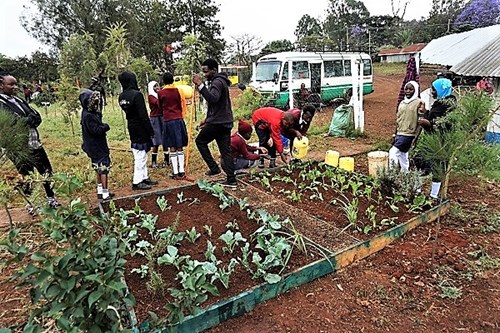
They sowed lemon grass, rosemary and lavender and planted mango and avocado trees, and speaking of trees, they even installed a Christmas tree as a focal point for those festivities (top right of garden in pic above). Afterwards an unashamedly proud Sally commented “The Three Bells’ garden is a beautiful place now, probably one of the only open green spaces in Kibera. It could be opened to the community, with families going there to relax and perhaps enjoy picnics together?”
Cosmopolitan? It wasn’t all work of course. By pure coincidence, on the first weekend of their fortnight’s stay, the eight Scouts were able to participate in JOTA (Jamboree On The Air – via amateur radio) & JOTI (Jamboree On The Internet) the largest annual Scouting event in the world, which connects all Scouts and Guides through tech comms’ tools. Thanks to the Rowallan online portal, our Scouts were able to talk with children in Australia, the USA and Côte d’Ivoire on the other side of Africa. “It is very interesting to talk and meet new people from miles away. We met a girl who was in Australia, which for England is like on the other side of the world, so amazing,” says Jack, aged 13.

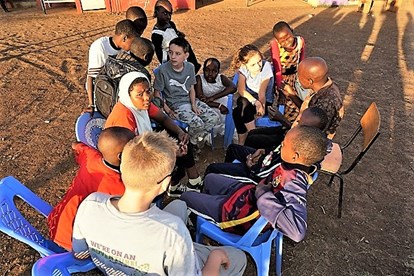
Of course, this was really about face-to-face meetings; it seemed they met hundreds of local kids, mostly Scouts but also lots of locals. Wherever they went they seemed to draw a crowd, all of whom wanted to talk about everything. Luckily they mostly spoke English, although heavily accented because Swahili is their native language. This didn’t hinder communication; it was good to see our youngsters quickly lose any shyness or reservation. Yes they were different in culture and colour but that didn’t seem to matter, which is at least one good thing that has come out of our cosmopolitan society back home these days.
Profound? Probably one of the experiences that had the deepest effect on them was their visit to the Grace Mission Humanitarian school in the heart of Kibera. To get there they had to traverse narrow muddy rubbish strewn alleyways, ducking under low corrugated tin eaves and crossing open sewers.


Once at the school they found it to be without electricity or lighting and as the windows were small, this made the mud wall classrooms dark. They had makeshift benches, which were populated by very well turned out and smiling children, who were visibly delighted with all the craft materials brought to them by our youngsters. The contrast between the conditions and the enthusiasm, not to mention the freshly laundered uniforms, was enormous. AND the students, all of similar age to their visitors, had to PAY to be there! “This was the most humbling experience for us all” said Sal. "The local youngsters’ lust for learning was palpable, and a real education for our pampered pupils".


Football? Didn’t all this start with a home-made football? Oh yes, there had to be a match. And of course the presentations. Not only did our youngsters take footballs to pass-on to the Kibera Scouts but also shirts, shorts and other things, like medals and a "silver" cup.
Yes, they were expecting to play against a Kenyan team; SIX teams turned-up, which they had to play in succession. “The Kibera scouts completely thrashed us” laughed Jack. AND those matches were enthusiastically supported, talk about being outnumbered by “away fans”. But it was all good FUN and afterwards, they did what Scouts’ do best, everyone got together around a campfire at the Rowallan campsite. The medals were brought-out and the Byfield cup presented, hopefully it will be engraved with the results of the first matches, with other tournaments following regularly.
Presentations? Not only were they giving presentations but there were two very important ones made to two 1st Byfield Scouts: Chief Scout Gold Awards, the highest award available to a UK Scout. Skip Sally had arranged for the ceremony, and it was very well done. The awards were presented to Ted and Jack by none other than Moses Dando, the Chief Executive of Kenyan Scouting. Upon their return to England, Jack also received his “50 nights away” badge but this time from Sal.


Food? They spoke of a camp fire. Well although the one after the football match was a big affair, they had been experiencing “open” camp fires every day; two braziers were used for cooking! Our youngsters helped with the preparation, mainly chopping vegetables but the food was cooked outside by George, a local “chef”. The majority of the dishes were chicken based, with a heavy emphasis on vegetables. George was very conscious of European tastes and limited the spices a lot but even so, there was still a hint of the flavour of Kenyan cooking to add to the experience. And they lapped it up; probably too exhausted and hungered by the day’s activities to apply the fads and fancies they doubtless imposed on their parents.
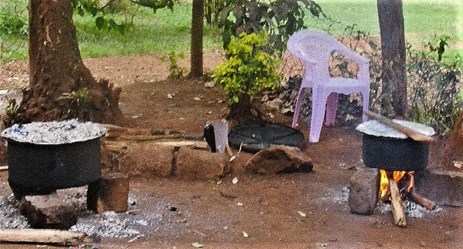

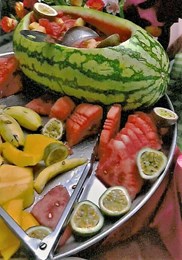
Tents? By now our intrepid team had passed-on footballs and associated kit to the local teams, pens, pencils, rulers and all kinds of crafty things to the schoolchildren and now it was the turn of the tents. There were eight patrol tents to leave behind in the hope that these lightweight domes could be easily carried by the Kibera Scouts, and would give them the opportunity to camp in the bush. After all, Kenya’s first National Park was only a few miles southeast of Kibera. Thus far, they needed a lorry to transport their only tent, so they hadn’t managed to get very far. With these new two-person units (which immediately accommodated half a dozen local children), great things were expected. Along with the tents the Kiberan Scouts were given wind-up LED lanterns and torches, hopefully to aid their outings away from the slums.


Transport? Well, chauffeured by Hussan, their resident driver, they went to and fro in that same mini bus but it was never reserved for them, there was always a herd of youngsters waiting to join them, usually just for the ride. We won't mention how many they managed to cram aboard but everyone was laughing and singing and having a jolly good time. The traffic was such that there was no way to speed, so what did it matter? It was just another way to cement international relations and provide contrasts, and happy memories.
Reward? The experience should really have been reward enough but you shouldn’t really go to Africa and not see the animals, so they went on safari. Just for a day or so at the end of the trip. AND, as a Scout visiting Nairobi not only were animals a “must see” but a pilgrimage to The Founder’s grave was also required. Robert Baden-Powell and his wife Olave are buried in the shadow of Mount Kenya in a suburb of Nyeri, a ninety-mile road trip north of Nairobi.


 BP’s cottage “Paxtu”, within the “Outspan” Hotel complex, is where he spent his last days and is now preserved as a museum. It not only contains memorabilia from his times over a hundred years ago but also a “knecker” from each troop that has visited. A “knecker” is the bandanna Scouts wear around their necks, which are woven with a distinctive pattern and secured by a “woggle”. There were hundreds of “kneckers”, now swelled by the addition of one from The 1st Byfield Scouts.
BP’s cottage “Paxtu”, within the “Outspan” Hotel complex, is where he spent his last days and is now preserved as a museum. It not only contains memorabilia from his times over a hundred years ago but also a “knecker” from each troop that has visited. A “knecker” is the bandanna Scouts wear around their necks, which are woven with a distinctive pattern and secured by a “woggle”. There were hundreds of “kneckers”, now swelled by the addition of one from The 1st Byfield Scouts.
Equator? As a “thanks for all their hard work” our Scouts were then driven a few miles further north, just across the equator to Ol Pajeta Game Park near Nanyuki. There they were able to straddle the line, and meet the residents.
And what did they see? They had already been close-up and personal with monkeys, who had been cavorting around their camp site this past week but here were elephant in abundance, just wandering across the track in front of them. There was no possibility of them giving way to you, and if they wanted to just block the road and stand and stare at you, well that’s what they could do, and did. The girls and boys had transferred to two special minibuses, with open roofs covered by a canopy to keep the rain off and the sunburn at bay. This meant that not only could they have a brilliant view of the animals but the animals could see, and smell, THEM.
Lion’s lunch? There WAS a sign on entering the park reminding you that to the animals, you were LUNCH, so obey the rules! Cameras were clicking and the animals mostly ignored them, just went about their daily business totally unconcerned that they were being observed. There were giraffe, impala, zebra, birds in abundance and LION. The vehicles were brought to a halt and a couple of lionesses came-over to inspect them. No doubt they could have jumped up onto the busses non-existent roof but they didn’t seem that interested, and wandered away but WHAT an EXPERIENCE. To cap it all, our Scouts' driver then parked-up, and they all had a picnic, sitting in a circle on the grass around their vehicles, with wild life in view in the distance.


 At an animal rescue compound there was the chance to rub noses with a rhino, and our youngsters almost did that – well, obviously the rhino was used to its head being scratched, shaking its horns to ask for more. And you could pet the giraffe, just like at Giraffe Manor, that very expensive hotel only a couple of miles south west of Kibera.
At an animal rescue compound there was the chance to rub noses with a rhino, and our youngsters almost did that – well, obviously the rhino was used to its head being scratched, shaking its horns to ask for more. And you could pet the giraffe, just like at Giraffe Manor, that very expensive hotel only a couple of miles south west of Kibera.
Perspectives? On their return a day later, Sally commented, “this trip to Kenya put a lot of things into perspective for the UK children, as Charlie aged 12 expressed: ‘for instance I went to a birthday party with the Kibera scouts and even though they have tin roofs, dirt floors and are really poor, they were still enjoying themselves. In England we have so much stuff, yet when you walk into town, everyone seems so miserable’ ” BUT we must leave this on a positive note, asked if they would go back tomorrow, with no hesitation they all said “yes way”… Let’s hope they do.
